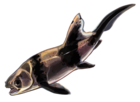Belemnacanthus
| Belemnacanthus Temporal range: Givetian
| |
|---|---|

| |
| B. giganteus | |
| Scientific classification | |
| Kingdom: | |
| Phylum: | Chordata
|
| Subphylum: | Vertebrata
|
| Class: | |
| Order: | |
| Family: | |
| Genus: | Belemnacanthus
|
| Species: | B. giganteus
|
| Binomial name | |
| Belemnacanthus giganteus Eastman, 1898
| |
Belemnacanthus giganteus ("Gigantic arrow-spine") is a large, extinct, barrel-shaped holonematid arthrodire placoderm from Givetian-aged strata of Middle Devonian Eifel, Germany. B. giganteus is known only from the holotype, a 37 centimetres (15 in) portion of a median dorsal plate with a long, somewhat high, arching crest running down the median line of the exterior/dorsal side of the plate. The plate has an ornamentation of ridges that originate from a point posterior to the preserved portion of the median dorsal plate. Before the plate was identified as that of a holonematid, the plate of B. giganteus had been successively described as a tremendous spine of an elasmobranch, an agnathan, and lastly, the plate of an antiarch.[1]
References[]
- '^ Denison, Robert (1978). Placodermi Volume 2 of Handbook of Paleoichthyology. Stuttgart New York: Gustav Fischer Verlag. p. 60. ISBN 978-0-89574-027-4.
Categories:
- Holonematidae
- Placoderms of Europe
- Placoderm stubs


